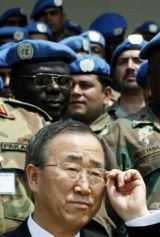UN chief sending envoys to press Sudan on Darfur force
December 5, 2007 (NEW YORK) — U.N. Secretary-General Ban Ki-moon said Wednesday he is sending high-level envoys to press Sudan’s president to accept non-Africans in the 26,000-strong peacekeeping force for Darfur and to get critically needed helicopters and heavy trucks for the new U.N.-African Union mission.
 Ban said in an interview with Associated Press editors that he was “deeply concerned and disappointed by this foot-dragging of the Sudanese government” in reaching a final agreement so that the force can start deploying in Darfur in January. He said he was also concerned at the lack of support from European countries and well-equipped developing countries.
Ban said in an interview with Associated Press editors that he was “deeply concerned and disappointed by this foot-dragging of the Sudanese government” in reaching a final agreement so that the force can start deploying in Darfur in January. He said he was also concerned at the lack of support from European countries and well-equipped developing countries.
He said he had spoken to many leaders around the world and “I have not gotten one single helicopter.”
For the force to be effective, Ban said, it needed 24 helicopters and heavy trucks.
The force would have the 26,000 troops needed if Sudan would agree to contingents from Thailand, Nepal, Sweden and Norway, which Sudan’s President Omar al-Bashir has so far refused to accept, Ban said.
The U.N. Security Council agreed that the force should be predominantly African – at Sudan’s insistence. But Khartoum has refused to approve the non-African units, even though 90 percent of the ground troops and 75 percent of the proposed force are from Africa.
“So I’m now experiencing difficulties from both ends – Sudan and from our own end,” said Ban, speaking at a luncheon at AP headquarters.
Ban said he is sending Assistant Secretary-General for Peacekeeping Edmond Mulet and his Deputy Chief of Staff Kim Won-soo to Lisbon, Portugal, on Thursday to meet al-Bashir, who will be attending the European Union-Africa summit this weekend.
He said they will be seeking to get al-Bashir to sign off on the composition of the force and on a host of technical and administrative issues, including permission for night flights, land for the force in several key towns, and a status of forces agreement.
“If there is political will, I think that can be resolved,” Ban said.
The United States pays 25 percent of all U.N. peacekeeping operations and has provided transportation and training for some troops rotating into Sudan. The U.S. has built and operated 34 Darfur base camps for AU peacekeepers, and has expanded seven camps that will be turned over to the hybrid force, according to Carolyn Vadino of the U.S. Mission to the United Nations.
Washington has also contributed nearly $4 billion since 2005 in humanitarian, peacekeeping and development assistance to the people of Sudan, Vadino said.
On another major issue, Ban said he expects a team of mediators from Russia, the United States and the European Union to report to him next week that they have been unable to broker a deal between Serbia and Kosovo’s ethnic-Albanian leadership on the future status of the territory.
“The report is highly likely to say they have not been able to agree,” Ban said.
Once he gets the report on Monday, the secretary-general said he would “need to get guidance from the Security Council,” which is scheduled to take up Kosovo on Dec. 19.
While Kosovo is a province of Serbia, it has been under U.N. and NATO administration since a 78-day NATO-led air war in 1999 that halted former Yugoslav leader Slobodan Milosevic’s crackdown on ethnic Albanian separatists. Kosovo’s majority ethnic Albanians have been pressing for independence but Serbia insists that it maintain control of the province.
As for the new U.S. intelligence estimate that said Iran halted its nuclear weapons program in 2003, Ban said he would still urge Tehran to comply with Security Council resolutions demanding the suspension of its uranium enrichment program and work with the International Atomic Energy Agency to answer all its questions about its nuclear activities.
(AP)
